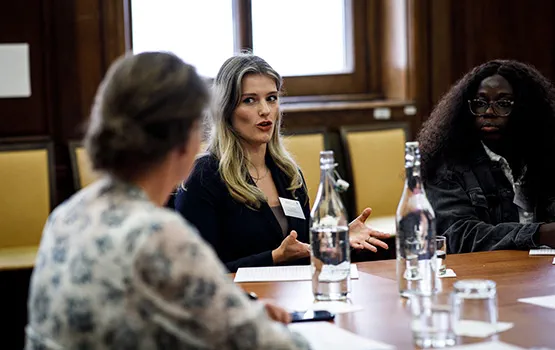In-house Network
Our In-house Network provides support and advice on key issues facing all in-house lawyers, working in the corporate and public sectors, not-for-profit organisations and charities.


Skill up for your in-house role
Gain essential legal, regulatory, and commercial skills with our new In-House Practice Diploma. Designed for in-house solicitors and those moving from private practice, this programme helps you stay compliant, confident, and fulfil your annual CPD requirement – all in one diploma.

In-house ethics framework
Help refine our in-house ethics framework: a suite of tools and resources to support you to balance your professional ethical obligations and your employers’ expectations.

All resources
- Becoming an in-house solicitor16 Nov 2023
- Beginning your organisation’s digital accessibility journey16 May 2024
- Climate risk governance and greenwashing risks: guidance for solicitors advising companies13 Oct 2023
- Cyber security guidance for solicitors15 Sep 2025
- Cyber security guidance for solicitors15 Sep 2025
- EU legal professional privilege after Brexit05 Aug 2025
- GDPR for solicitors26 Sep 2025
- How to apply for vacation schemes and training positions31 Oct 2025
- How to position the in-house ethics framework in your organisation27 Oct 2025
- Impact of climate change on solicitors19 Apr 2023
- In-house ethics framework resources14 May 2025
- In-house networks and groups14 May 2025
- Part five: appendix and acknowledgements03 Nov 2025
- Part four: information and resources03 Nov 2025
- Part one: planning developing and maintaining a programme03 Nov 2025
- Part three: precedents and pro formas03 Nov 2025
- Part two: procedures and practice issues03 Nov 2025
- Pro bono guide for in-house solicitors28 Jan 2025
- Pro bono manual03 Nov 2025
- Recommended minimum salary for trainee solicitors and SQE candidates22 Jul 2025
- Stress and mental health17 Oct 2025
- Supervision: good practice for remote supervision of junior staff and trainee solicitors29 Jul 2024
- Support for solicitors facing disciplinary investigation and enforcement29 Oct 2025
- The in-house solicitor and ethical organisational culture06 Nov 2025
- The role of the in-house solicitor14 May 2025
- Whistleblowing as an in-house solicitor27 Oct 2025
- Who is regulated under the Money Laundering Regulations 2017?17 Jun 2024
- Working effectively and ethically as an in-house solicitor27 Oct 2025
- Workplace harassment: guidance for employers18 Oct 2024
- Annual Statistics Report 201919 Oct 2020
- Annual statistics report 201807 Oct 2019
- Annual statistics report 2022: what does the solicitor profession look like?07 Dec 2023
- Annual statistics report 202323 Jan 2025
- The results are in: how do solicitors feel about their profession? 06 Apr 2023
- Can a company recover costs as a litigant in person?29 Oct 2024
- Can an in-house solicitor represent an employer in court?25 Nov 2024
- Can in-house solicitors conduct litigation on behalf of employers?11 Nov 2024
- I plan to move from private practice to an in-house role. Do I need PII?21 Jul 2025
- I work in-house and feel excluded by my organisation. What support is available?21 May 2025
- Is there guidance on professional undertakings when working in-house?16 Apr 2025
- Disability inclusion in law firms and legal teams18 Aug 2025
- Model whistleblowing policy template27 Oct 2025
- Pro Bono Charter25 Jul 2025
- Template contract amendment letter for in-house solicitors27 Oct 2025
- Template job description for in-house solicitors14 May 2025
- The role of the in-house solicitor: protocol for employing organisations27 Oct 2025
- Economic Crime and Corporate Transparency Act27 Nov 2025
- What’s new in the in-house ethics framework27 Oct 2025


Tired of searching for relevant and reliable precedents and commentary?
Save time and resources by letting our expert library team find the most appropriate precedents and guidance for your requirements with our remote enquiry service.







